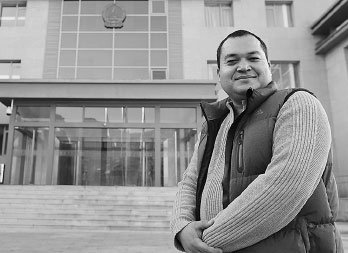The Uygur who puts the accent firmly on Beijing
Updated: 2015-01-16 07:12
By Gao Bo(China Daily)
|
|||||||||||
When we met, Asanjan Memet was negotiating with a tourist operator, trying to persuade the company in Sichuan province to invest in his community on the outskirts of Beijing.
After nine years living and working in the Chinese capital, the Xinjiang-born 33-year-old speaks with a Beijing accent. "Unless people know my name or my colleagues introduce me, strangers don't know I'm a Uygur from my speech or mannerisms," he said with smile.
Asanjan works in Shidu township in the Fangshan district, close to the border with Hebei province, about 80 kilometers from the center of Beijing. The area is famous for its mountainous Karst landscape along the Juma River, which runs through the town.
As deputy director of the programs promotion office under the township government, Asanjan introduces companies and investors to Shidu to develop the local tourism industry.
"Tourist numbers surpassed 3 million in 2013, which helped a lot of locals to increase their incomes," he said, "About 85 percents of the villagers work in the tourism industry. That's why so many companies want to invest here."
Asanjan's aim is to maintain the sustainable development of the industry, and prevent the search for profit from damaging the local environment. His life as a township official started in 2006. Having recently graduated from the China University of Geosciences, Asanjan applied to become a village official, and after passing the entry exam he became an assistant to the head of Xidi village under Liulihe township. "I just regarded it as a chance to learn and practice at the grassroots. I didn't imagine I would stay there so long," he said.
Although pressure of work prevents him from visiting Xidi very often, he has happy memories of the three years he spent there, and even remembers most of the villagers.
Initially, he was unfamiliar with local conditions and the basic policies in the rural areas. "I always thought I could do everything well, but it wasn't easy to be a qualified village official. So I concentrated on every tiny thing related to the villagers," he said. Although he had been shy at college, his work required him to talk face-to-face with every villager, which boosted his confidence.
After a year in Xidi, he was honored by the villagers, who voted him one of the top 10 village officials out of the 1,000-plus in Beijing. He said he thought deeply about his work. "I accumulated knowledge and experiences day by day and tried to find solutions by myself," he said.
Although he was grateful that the Shidu government arranged halal food for him when he arrived, Asanjan felt the township needed a restaurant where Muslims would feel comfortable, safe in the knowledge that the food they were eating conforms to Islamic standards, so he and a younger brother started one near a scenic spot in 2011.
It quickly became popular. "One day, several students from Pakistan came to the township, but they refused to pay for a meal they'd ordered at a household restaurant because they thought the food wasn't halal. The two sides quarreled, so I went there, and explained everything in English," he recalled.
"The conflict was resolved the minute they ate in the Muslim restaurant, because they were ravenous after their daylong visit."
Now, two of Asanjan's brothers live in Shidu with their families. During the peak seasons, the Xinjiang-themed restaurant plays music and arranges dances every night. Tourists are welcome to participate, whether they eat at the restaurant or not. "It's a window for the locals and tourists to learn something about Xinjiang. It's a kind of cultural presentation," Asanjan said.
Every few months, his mother visits from her home in Maigat county in Xinjiang. Next time she arrives, she will have a new grandchild to cosset, because Asanjan and his wife are expecting their first child, and have recently rented a new apartment, about an hour by car from his office.
"I'm a Beijinger. I'm also a Xinjianger," he said.
gaobo@chinadaily.com.cn
|
Life as a township official in Beijing has opened new doors for Asanjan Mehmet, who aims to teach the world more about the capital and his home in the west of China. Wang Jing / China Daily |
(China Daily 01/16/2015 page5)
Today's Top News
Belgian police kill two in raid on suspected Islamists
Chinese fleet brings out the crowds in visit to Britain
US, German leaders urge implementation of ceasefire deals in eastern Ukraine
Obama hosting UK's David Cameron for working dinner
Keeping in step with the shanghai beat
The Uygur who puts the accent firmly on Beijing
Thai railway project to commence in September
Italian president resigns
Hot Topics
Lunar probe , China growth forecasts, Emission rules get tougher, China seen through 'colored lens', International board,
Editor's Picks

|

|

|

|

|

|






